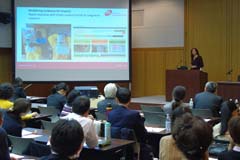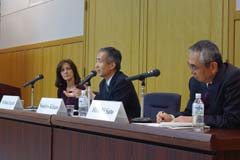Research Institutes Can Impact Implementation of SDGs, IDS Head Melissa Leach Tells Audience at JICA-RI
2015.12.08
Melissa Leach, director of the Institute of Development Studies, gave a lecture in Tokyo on Nov. 19, 2015, on how development researchers and research institutes are engaging with the Sustainable Development Goals (SDGs) and challenges present post 2015.
The dialogue was held before an audience of more than a hundred prominent researchers and other interested parties at the JICA Ichigaya Building.
Seizing on the opportunity provided by this time of transition between the Millennium Development Goals and the SDGs, the JICA Research Institute and the Institute of Developing Economies, Japan External Trade Organization (IDE-JETRO) welcomed the director of IDS, a leading global research institute in the United Kingdom, to provide an opportunity to share visions and strategies toward the SDGs between British and Japanese research institutes.

Melissa Leach gives a lecture
Leach began by pointing out that the world has become deeply globalized, interconnected and multipolar and it is no longer possible to look at development as simply developed countries giving aid to developing countries. It has also become impossible to look at countries in isolation, she said.
As examples of the interlinkages, she mentioned climate change affecting countries far from those that caused it and the Ebola epidemic in West Africa causing panic around "a world of mobile information, microbes and people."

Palau, threatened by
the effects of climate change
(Photo: JICA/Kaku Suzuki)
"It's become pretty clear from what environmental scientists are telling us that business as usual and simply seeking economic growth and poverty reduction and so on won't do unless we also make sure that that growth is steering us within what some scientists are now calling planetary boundaries," she said.
She said SDGs provide opportunities to shape transformative, sustainable development pathways locally, nationally or globally and research institutions have a key role to play as governments work out how they will engage with the SDGs.
"This is a really pivotal moment when the SDGs could really be fantastic or they could be really disappointing. And I think there's a big role for research institutes in helping it to be the former."
Next Leach explained IDS' new five-year strategy of "engaged excellence." It consists of four interdependent pillars, she said: 1. deliver high-quality research, 2. co-construct knowledge (involving non-academic stakeholders in co-designing, co-producing and co-delivering knowledge) 3. mobilize evidence for impact (involving stakeholders in research and using technology to ensure it reaches those who can use it), and 4. build enduring partnerships.
Leach next gave thorough examples of how IDS work supports each of the 17 goals in the SDGs.
"I would really like to explore ways that we could do [our work] in partnership with some of the institutions here in Japan," she concluded.
JICA-RI Deputy Director Kitano spoke after Leach. In his presentation, "Visions and Research Plans of JICA Research Institute for the SDGS," he said that JICA-RI has links to JICA projects and is conducting research that contributes to issues faced on the ground in developing countries.
He said, in the flagship research it is currently engaged in, JICA-RI is examining the four key features of "quality growth" (inclusiveness, sustainability, resilience and innovation), and he thinks these four features have an affinity to the goals of the SDGs and to Japan's new Development Cooperation Charter.

Leach, Kitano and Sato
(from left)
Hiroshi Sato, chief senior researcher of IDE-JETRO, mentioned that IDE-JETRO noted the need for Japanese institutes to get more involved in the implementation of SDGs.

事業事前評価表(地球規模課題対応国際科学技術協力(SATREPS)).国際協力機構 地球環境部 . 防災第一チーム. 1.案件名.国 名: フィリピン共和国.

事業事前評価表(地球規模課題対応国際科学技術協力(SATREPS)).国際協力機構 地球環境部 . 防災第一チーム. 1.案件名.国 名: フィリピン共和国.

事業事前評価表(地球規模課題対応国際科学技術協力(SATREPS)).国際協力機構 地球環境部 . 防災第一チーム. 1.案件名.国 名: フィリピン共和国.

事業事前評価表(地球規模課題対応国際科学技術協力(SATREPS)).国際協力機構 地球環境部 . 防災第一チーム. 1.案件名.国 名: フィリピン共和国.

事業事前評価表(地球規模課題対応国際科学技術協力(SATREPS)).国際協力機構 地球環境部 . 防災第一チーム. 1.案件名.国 名: フィリピン共和国.
scroll